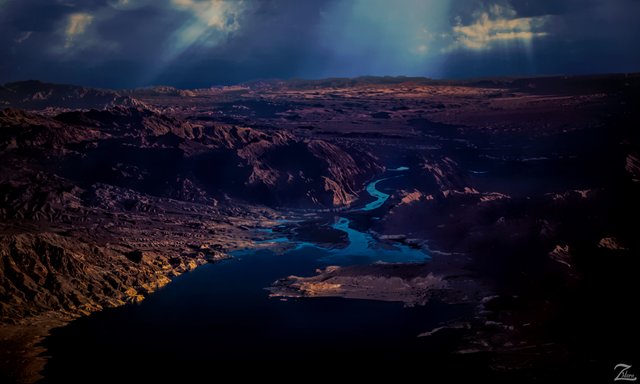Beautiful and Mysterious View of the Colorado River Exiting the Grand Canyon
With sunlight streaming through skies darkened from the thick storm clouds nature paints a brilliant palette juxtaposing the rich copper reddish colors against the deep blue hues of the river as it passes Devils Cove and the Iceberg Reef through Iceberg Rapids and Sunfish Cove and around Sandy Point into Lake Mead.
As the Colorado River exits the Grand Canyon it passes through Iceberg Canyon into Lake Mead in the Gregg Basin. Following a great rainstorm I captured this image while flying northeast over the Gregg Basin on my way to land and camp out at Grand Canyon Gulch.
In Spanish: Río Colorado, means "Colored River", with an implication of the natural reddish, muddy color the river used to have that caused by its natural sediment loads. After multiple dams were built to harness power and control seasonal flooding (still controversial after many decades) the upstream silt is now filtered out by the dams and is no longer seen as muddy or colored but instead has acquired a clear blue-greenish hue as seen here.
One of the principal rivers of the Southwestern United States and northern Mexico The 1,450-mile-long (2,330 km) Colorado River drains an expansive, arid watershed that encompasses parts of seven U.S. and two Mexican states. With its headwaters located high up in the central Rocky Mountains in the U.S., the river flows primarily southwest crossing the Colorado Plateau and into the Grand Canyon before reaching Lake Mead on the Arizona–Nevada border. Here it sharply turns south towards Mexico where it runs through the mostly dry Colorado River Delta at the tip of the Gulf of California between Baja, California and Sonora.
The first humans of the Colorado River basin were likely Paleo-Indians of the Clovis and Folsom cultures, who first arrived on the Colorado Plateau about 12,000 years ago. Beginning with small bands of nomadic hunter-gatherers, First Nations Tribal peoples inhabited the Colorado River basin beginning 8,000 years ago. Between 2,000 and 1,000 years ago, the river and its tributaries fostered large agricultural civilizations, – some of the most sophisticated indigenous cultures in North America – which eventually faded over time.
Another notable early group was the Fremont culture, whose peoples inhabited the Colorado Plateau from 2,000 to 700 years ago. The Fremont were likely the first peoples of the Colorado River basin to domesticate crops and construct masonry dwellings; they also left behind a large amount of rock art and petroglyphs, many of which have survived to the present day. It is worth noting that a great deal of controversy still exists over First Nationals Tribal water rights in the Colorado River basin which have been routinely largely ignored during the extensive water resources development carried out on the river and its tributaries. Construction of dams has often had negative impacts on First Nations peoples, such as the Chemehuevi; their riverside lands were flooded after the completion of Parker Dam in 1938.
Ten Native American tribes in the basin now hold or continue to claim water rights to the Colorado River. There are at least 5 First Nations names for the Colorado River -
- Maricopa: Xakxwet
- Mohave: 'Aha Kwahwat
- Havasupai: Ha Ŧay Gʼam and Sil Gsvgov
- Yavapai: ʼHakhwata
This is from my ongoing project in which I am trying to raise awareness of the 47% of the USA and 90% of Canada that remain unpopulated wilderness.
Where Eagles Fly - The American Wilderness Expedition is my personal mission to introduce people to these amazing locations that surround us.
If you like what you see here upvote then resteemit so that others may experience these wondrous places as well. Yehaw!!

Wow, fantastic
Good post.
What a fantastic photograph of the Colorado River that what nature is all about . keep it up @mannyfig1956
Wow. This is amazing! Would make a great artpiece on the wall <3 beautiful
Thanks, yes it would be a very nice print!!
That all the picture is great view, wonderful... How you got that.....? what ever , I like to call you " the great master". I hope, I got your permit to download the lovely picture's. Thanks for sharing, I appreciates that.
Thanks and of course you can download them, just please do not repost them anywhere please.